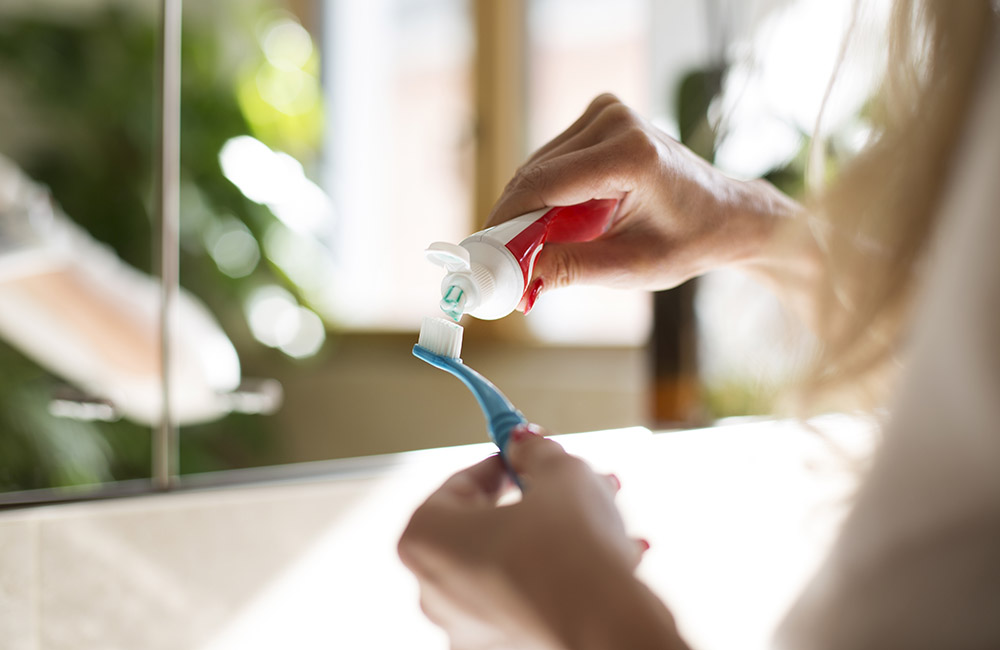
There’s something new in the world of toothpaste, and no, it isn’t charcoal again. You may have already begun to see advertising for new mineral toothpaste, and if you’re anything like us, the term might stop you short.
Mineral toothpaste? Don’t all toothpastes have minerals? you probably thought.
At least, we did. So, we asked the experts to break it down for us and explain everything there is to know about mineral toothpaste, if it works, and who it’s for.
What is Mineral Toothpaste?
Well, it’s a few things. It’s a new primary ingredient to replace fluoride in toothpaste, it’s a novel theory about remineralizing our teeth and, of course, it’s a marketing tool.
Los Altos, CA cosmetic dentist Joseph Field, DDS explains that the use of the word ‘mineral’ is a bit confusing. “Mineral toothpaste is a marketing term,” Dr. Field says. “All toothpastes contain minerals. Fluoride is a mineral. Their twist on it is that instead of using fluoride, they’re using hydroxyapatite, which is what we have in our enamel.”
Throughout the day, our teeth lose minerals in a process called demineralization. “As we eat and drink throughout the day, we’re making a more acidic environment in our mouths,” Dr. Field explains. “And that demineralizes our enamel and tooth structure.”
New York cosmetic dentist Timothy Chase, DDS explains that using hydroxyapatite is designed to remineralize your teeth. “Reminerlization is the process where the body or toothpaste restores the structure of the tooth that gets damaged from the acid we ingest or create in our mouth that begins the process of digestion,” Dr. Chase explains. “Saliva naturally remineralizes our teeth, and hydroxyapatite and fluoride helps with that process.”
Will Mineral Toothpaste Clean Your Teeth?
According to Dr. Chase, the initial studies on hydroxyapatite are solid. “Some studies have shown that hydroxyapatite is just as effective as fluoride in protecting tooth structure and is nontoxic,” Dr. Chase says. “Other studies show that fluoride may harden teeth a bit better, or may work better in a more acidic environment, such as the mouth after eating sweets.
That said, since this is a relatively new idea, there haven’t been a lot of studies yet. “Intrinsically, this idea makes a lot of sense,” Dr. Field explains. “But how well it works kind of remains to be seen, as we don’t have a lot of data yet.”
According to New York dentist David Chen, DDS in his review of Risewell mineral toothpaste, he explains that of your ‘natural’ toothpaste options, mineral toothpaste is certainly the best. “Mineral toothpaste is the only type of remineralizing agent that can protect your teeth from tooth decay,” Dr. Chen says. “All of the other natural toothpastes with xylitol, charcoal, etc. do not have these anti-decay benefits.”
That said, hydroxyapatite is not yet approved by the American Dental Association. In fact, only fluoride-containing products have the seal of approval from the ADA, which may change given enough continued study.
So, Why Replace Fluoride at all?
There are a few reasons why someone might not want to use a fluoride-based toothpaste. “There are people that have legitimate sensitivities to fluoride,” Dr. Field explains. “And it does cause some issues with abrasiveness, so having alternatives is not a bad thing.”
Of course, fluoride also doesn’t have the best reputation, despite being a critical part of our approach to dental health. Since the early 1900s, fluoride, a naturally occurring mineral, has been a huge factor in reducing tooth decay. It occurs naturally in some foods and water supplies and helps strengthen our tooth enamel.
“Fluoride is the gold standard,” Dr. Field explains. “It’s been used for decades, there’s tons of documentation and tons of case studies so that we know it’s good and safe.”
Still, though, it gets a bad reputation. “The reality is that in doses beyond what we consider therapeutic range, it can be dangerous,” Dr. Field says. “Which is true for lots of things.”
But, since it can be difficult to change someone’s mind, having an alternative for those wary of fluoride isn’t the worst idea.
“It appears that the latest research is showing that hydroxyapatite is a viable option for people who wish to avoid fluoride,” Dr. Chase says. “When choosing a toothpaste, make sure it contains either hydroxyapatite or fluoride, and make sure it is non abrasive—so, avoid whitening toothpastes.”
Choosing Your Toothpaste
“Having FDA approval and a seal from the American Dental Association is a great bet when you’re choosing a toothpaste,” Dr. Field says.
According to Dr. Chase, it’s best to keep your toothpaste simple.
“I recommend using as basic a toothpaste as possible, no whitening, no gum care, no sensitivity ingredients,” Dr. Chase says. “Unless otherwise recommended by your dentist.”
If you’re interested in mineral toothpaste because you have a sensitivity to fluoride, we’d recommend chatting with your dentist first.






